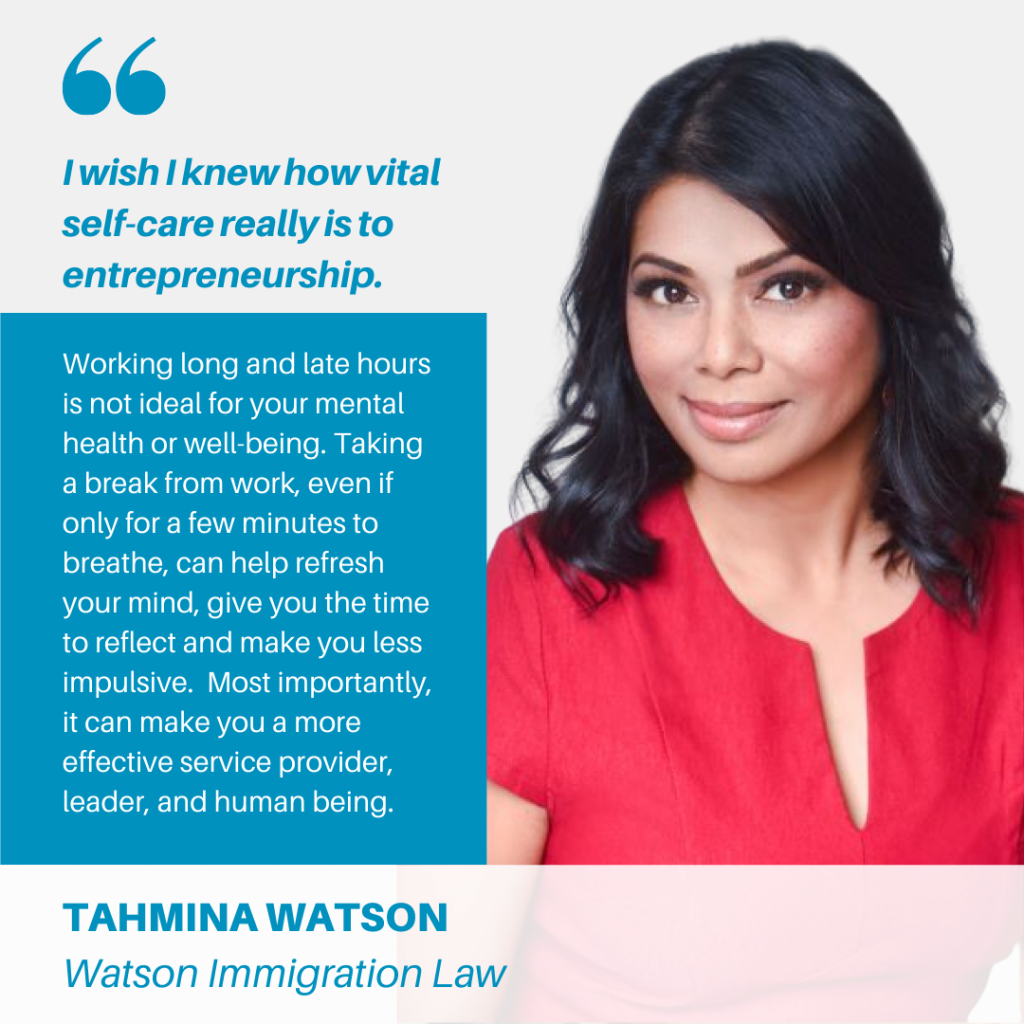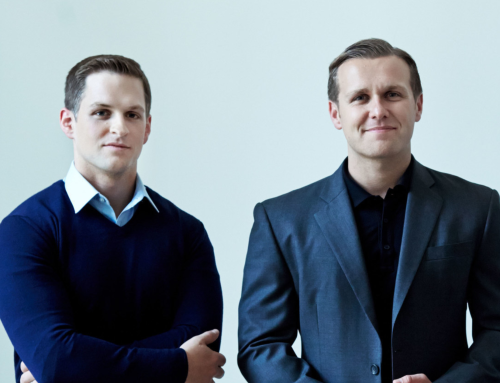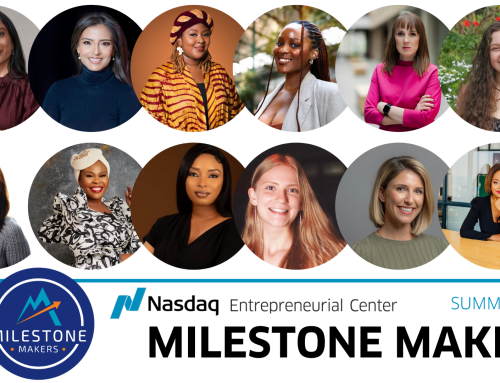Tahmina Watson is the founding attorney of Watson Immigration Law in Seattle, where she practices U.S. immigration law focusing on business immigration. She has been writing about immigration law since 2008 and has authored articles in numerous publications. She is the author of Legal Heroes in the Trump Era: Be Inspired. Expand Your Impact. Change the World and The Startup Visa: Key to Job Growth and Economic Prosperity in America. She is also the founder of The Washington Immigrant Defense Network (WIDEN), and is a co-founder of Airport Lawyers. Tahmina is regularly quoted in the media and is the host of the podcast, Tahmina Talks Immigration. Business Insider recently named her as one of the top immigration attorneys in the U.S. that help tech startups.
What does “entrepreneurship” mean to you?
 Tahmina Watson: Entrepreneurship means boldly stepping into your purpose and passion, making your vision to serve a reality and striving – through your actions – to make the world a better place.
Tahmina Watson: Entrepreneurship means boldly stepping into your purpose and passion, making your vision to serve a reality and striving – through your actions – to make the world a better place.
How did your company come to be?
TW: I moved from the U.K. to the U.S. in 2005, took the New York Bar examination in 2006 and, shortly after, became a partner at a small law firm. But I quickly recognized how different my values were from those of my business partner. I was still a new lawyer at the time and very afraid of starting a solo practice. Can I really run my own business? Do I know enough law? Will I have enough clients and sufficient business to stay afloat?
I clearly recall that critical moment when my husband, who is also a lawyer, challenged me and encouraged me with a pep talk. He told me that I should ‘give it a go’ and that I had the ‘freedom to fail.’ So, on January 1, 2009, I opened the doors to my own practice, Watson Immigration Law, and I have not looked back.
How has your business changed in response to the COVID-19 pandemic?
TW: In terms of practice and operations, like most other businesses, our law firm has become more virtual. I am seeing almost all my clients via Zoom. Sometimes, we speak on the phone, but I have not seen any clients in person since March 2020.
As a team, we are generally working remotely. However, immigration law is paper-heavy so, to maintain social distance, we play musical chairs with members of the team going into the office.
What is your proudest and darkest moment so far?
TW: There are too many to mention. One of my proudest moments involves a startup client. This was in the days before the immigration service had specific policies for startup businesses. This client had a particularly complicated case. A Techstars grad founded and co-owned a company that was acquired. In line with usual agreements in such situations, my client had to agree to be employed for a certain length of time, but wanted the option to return to work afterwards. However, the acquisition gutted the original company, leaving it a hollow shell with no office, no funds, and no clients – all the things immigration officials would look for if asked to consider a petition for an H-1B visa.
The case was referred to me by another colleague because of the enormous challenge it presented. However, I was able to successfully secure an H-1B work visa for the client, allowing him to operate his startup company without any hassle. To this day, it remains one of my most successful startup H-1B petitions.
As for lows: immigrant entrepreneurs, who represent a significant portion of my business, are presented with challenges all the time, so it’s hard to choose just one. Being in business as a woman, and particularly as a woman of color, is a constant test of perseverance – even 15 years on.
I have learned to be better about holding my ground, especially now that I have so much more experience and am considered an expert on immigration – particularly on startup and business immigration issues. But in the early days, and sometimes even now, my time and expertise are not considered valuable to some. I sometimes get clients who want to ‘mansplain’ things to me. One of my lowest moments, for example, was when a client demanded all his fees back, including the funds I had put towards his case, because he was abroad. He was cold, condescending, and scary. I am convinced he would not have acted that way if I were a man.
How is your company changing the landscape?
TW: Through my law firm, I have been able to pursue a lot of immigration advocacy work, which I am immensely proud of. Being an immigration lawyer affords me the privilege of seeing the many challenges my clients face up close. Whether they are CEOs, high-skilled immigrants stuck in an endless Green Card backlog, or persecuted asylum seekers, their frustrations are evidence of an immigration system that is undeniably broken. I have been a vocal advocate for reform. Since I started my firm, I have been a strong voice for a Startup Visa that resulted in me writing my first book, The Startup Visa, which was launched at SXSW in 2015, and rewritten and released in July 2021. In addition, over the last four years, I was able to work on solutions to the wide-scale immigration chaos we observed. I co-founded Airport Lawyers, a group of lawyers who provided pro bono legal assistance to travelers caught in the trap of the Muslim travel ban. I also founded WIDEN to help provide free legal representation at immigration trials to families who had been separated at the Southern border. Additionally, I helped create a new model for pro bono immigration legal clinics. I cover some of these stories in my book, Legal Heroes in the Trump Era.
While my day job is practicing law, advising clients and winning cases, my ‘night job’ has become writing and advocating for change. I know I have made strides. Being the voice of my clients is a privilege that I take to heart.
What do you wish you knew when you started? Is there anything you would do differently?
TW: I wish I knew how vital self-care really is to entrepreneurship. Working long and late hours is not ideal for your mental health or well-being. Taking a break from work, even if only for a few minutes to breathe, can help refresh your mind, give you the time to reflect and make you less impulsive. Most importantly, it can make you a more effective service provider, leader, and human being.
What advice/credo do you live by as you grow the business / what is your professional and personal mission statement?
TW: Having a happy and uplifting environment around me is crucial. Immigration law is complex, challenging and often heartbreaking. But within that, you must remain positive – for yourself, your clients, and your team. And to do that, you need to eliminate the complexities that are within your control. As such, my simple rule is to eliminate negativity from my surroundings, so I can be my best self for everyone who needs me. It is easier said than done but, to me, it is an essential component of my success.
Where do you find inspiration when faced with challenges?
TW: My two beautiful daughters are my core inspiration. I want to ensure they are living in a better, safer world. I want them to know they can do anything they want and that they must also strive to make things better for others around them.
As an immigration lawyer, challenges are a natural part of my practice. The four years under the previous administration were exceedingly difficult ones, which included policies that separated children from their mothers. As a mother, it was hard not to put myself in their shoes. And that inspired me to find novel ways to bring access to counsel to detained and non-detained immigrants.
What does “success” look like for you? What do you think will help you achieve it?
TW: At different points, and different stages of entrepreneurship, success can look quite different. At the start of a business, for example, one needs to keep the business alive, know they are making a profit while doing a good job. At this stage of my career, having confronted and worked through an ill-equipped immigration system, written extensively about the changes I wanted to see through articles, columns, Op-eds and books, I now want to see the laws changed. Having immigration laws that are fit for modern times is good for America, startups and the startup ecosystem, the tech industry and all businesses, family reunification, immigration courts, asylum seekers and refugees. I will continue to be an advocate for these changes, and particularly for a startup visa in America.
Has personal or professional “success” changed for you since the COVID-19 pandemic?
TW: Covid-19 gave me the opportunity to look inwards and reflect. It has made me stronger and more determined to be an advocate for change. During Covid, I have written two books, and became a columnist for both Above the Law and Entrepreneur magazine. This period has made me realize that, if I can help make some of these changes I advocate for come true, I will make an impact, and I will consider that part of my success.
What’s it like to work alone or with your partners? What advice do you have for fellow entrepreneurs about building and leading teams?
TW: I believe compassion is a key element in life, whether you are dealing with partners, clients, or teammates. In addition, self-motivation and leading by example are important to achieving success. It means you must remain willing and open to listening to and respecting others. Understanding the unique needs of those around you will help ensure you achieve the ultimate goal of serving your customers/clients well, and thus success for the company. For example, I frequently remind my team about self-care as our area of law is constantly changing, so stressful and complicated. I have even insisted they meditate with me!
Many entrepreneurs continue to perfect their daily routines to support their work and greater vision; would you mind sharing your morning routine or a regular ritual that grounds your work each day? How has it changed in recent months?
TW: I wake up around 5am, meditate, journal, work on my columns/book and then start work around 8am. Covid-19 allowed me the opportunity to have the routine I wanted without the rush of making breakfast/lunch bags for the kids, dropping them off at school and trying to beat rush hour to get to the office. My work hours have not reduced, but I am able to wake up early and have time for myself.
What keeps you motivated during this time?
TW: In addition to my daughters, my clients inspire me every day to be a better advocate for them and for the causes I believe in. My clients include startups, tech companies, entrepreneurs, high-skilled immigrants, as well as individuals seeking to reunite with loved ones and those applying for U.S. citizenship. I am also a consultant on policy matters to nonprofits, community organizations and policy makers. The immigration system in this country is not working for either legal or undocumented immigrants. We need a system that better serves everyone. Knowing this and seeing the need for it every day motivates me to keep going.
What kind of an entrepreneur do you want to be known as, as in, what do you want your legacy to be?
TW: I want to be known as a compassionate leader who strived to make a difference in U.S. immigration law. I want to be a go-to authority on the issues I am passionate about and on the change I want to see.
What is a quote or some words of wisdom that help get you through the tough days?
TW: ‘You must be the change you wish to see in the world’– a quote that many attribute to Mahatma Gandhi.
Have you experienced mentorship in your career? Do you feel it was easily available to you?
TW: I believe mentorship is vital to one’s growth. I have been fortunate in my career to have the mentorship of some incredible people who love me unconditionally, recognize my potential, and encourage me in everything I do. The immigration lawyers’ community is a warm and collegial one. It is easy to make lifelong friends within the community of ‘your people.’
Who are the people who have mentored or influenced you in your life or career? How has their influence changed the trajectory of your entrepreneurial journey?
TW: There are several. Of those, my mother and my husband are the two most important people in my life who have influenced me. My mother, in her sacrifice and determination, ensured I became the lawyer we dreamed of. And my husband, Tom Watson, gave me the courage and support to be the entrepreneur and business owner that I am now.
Do you have someone you’d like to nominate to be profiled in our Faces of Entrepreneurship series? Please let us know by emailing media@thecenter.nasdaq.org.




Invite a Friend
Close